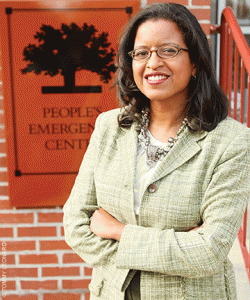 Class of ’90 | On a warm summer night more than 20 years ago, Farah Jimenez C’90 L’97 was on her way to a fraternity party on the Penn campus when she saw something that stopped her in her tracks.
Class of ’90 | On a warm summer night more than 20 years ago, Farah Jimenez C’90 L’97 was on her way to a fraternity party on the Penn campus when she saw something that stopped her in her tracks.
It was a man who visited her every day at the University City Hospitality Coalition, a nonprofit founded by Penn students in which homeless people and families in need would work with volunteers to prepare meals and then sit down and dine in a family-style setting. The communal gathering was a way to address the invisibility of the homeless.
This one man, however, came each day not only for the food but to sit and chat with Jimenez, then the coalition’s executive director. It was company he wanted, too, she knew. And then she saw him that night.
“I realized at that very moment he’s wandering around looking for a place to lay his head that night, and it was a real awakening—about the difference in our lives, how challenging it must be for him, and I wasn’t able to do more than offer a meal,” she recalls. “I cried so much that night, and didn’t get to the party.”
It was a moment that led to a career of assisting people and combatting homelessness.
 Since 2010 Jimenez has been president and CEO of the People’s Emergency Center (PEC), a West Philadelphia organization that provides shelter, schooling, and assistance for mostly homeless women and children. Her role, she says, is to “drive the vision for the organization and put in place the financial and human resources that will help deliver on that vision.”
Since 2010 Jimenez has been president and CEO of the People’s Emergency Center (PEC), a West Philadelphia organization that provides shelter, schooling, and assistance for mostly homeless women and children. Her role, she says, is to “drive the vision for the organization and put in place the financial and human resources that will help deliver on that vision.”
Founded in 1972 with a staff of about 25 volunteers and a $12,000 budget, PEC now has nearly 80 employees and a budget of $8.5 million. The organization provides shelter to families with the goal of helping them transition to one of its 200 subsidized housing units in University City. (The rental income from these properties accounts for about 10 percent of PEC’s annual income, with another 15 percent coming from foundations, corporations, and the United Way. The rest is from government contracts.)
“PEC has been a wonderful partner with the community in West Philadelphia in developing permanent housing opportunities, rehabbing vacant structures, and creating affordable housing,” says Dennis Culhane, the Dana and Andrew Stone Chair in Social Policy at Penn. “The permanent housing stock they’ve created has been quite valuable to the neighborhood and community.”
Jimenez was also recently appointed by Pennsylvania Secretary of Education Ronald Tomalis to the Homeless Children’s Education Task Force, which is charged with assessing and responding to the education-related needs of homeless children throughout Pennsylvania. She is one of only two direct-service-agency leaders appointed to the 12-member group.
Her career in community development has included stints in housing policy and advocacy, public housing, and consulting. Before she took the helm at PEC, Jimenez spent 13 years leading Mt. Airy USA, a nonprofit Philadelphia organization that used real-estate development strategies to help improve that neighborhood’s commercial corridor, which in turn led to improved housing stability in the area. There she learned that access to affordable housing was a key to solving the homeless problem. In 2006 President George W. Bush appointed her to a five-year term on the Community Development Advisory Board of the US Treasury Department’s Community Development Financial Institutions Fund.
 Not long after graduating from Penn, Jimenez thought she might like to work on a congressional committee dealing with the homeless, or for an advocacy group.
Not long after graduating from Penn, Jimenez thought she might like to work on a congressional committee dealing with the homeless, or for an advocacy group.
“And like a Penn student with a strategy,” she says, “I called all the congressional committees I wanted to work on and asked, A) what type of education do I need to get a job there, and they said go to law school, and B) what law school should I go to, and many suggested I go to Penn.”
Another reason for choosing Penn Law was that students were expected to devote a certain number of hours of service.
“The most important skill I took with me from law school was the ability to analyze a case,” she says. “It is a skill that adapts well to solving large societal problems. For example, in order to solve a legal question or, for my work now, a large-scale social problem, one needs to be able to isolate the question being asked and ensure that all of the activities and facts being strung together to answer that question do indeed answer that question. In the legal world, that is called the theory of the case. In the nonprofit world, we call that a theory of change.”
Jimenez notes that while more than 40 percent of PEC’s budget is used for housing people, providing shelter alone won’t solve the issue of homelessness.
“Dealing with homelessness is also about tackling behavioral health needs, and it’s about tackling the skills they need,” she explains, “so we have four education centers to develop technical skills and parenting skills as well as employment skills, so they can move from subsidized housing altogether.
“We have an expectation that our families be engaged in five hours of meaningful activity every day,” she adds. “It can be in the form of a job, or take the form of enrolling in one of these centers to take advantage of the learning that we offer.”
PEC’s Center for Digital Inclusion/Technology (which accounts for 16 percent of its budget) is used not only by those who are seeking shelter. In the past two years more than 60,000 people have used that facility. The other centers include one for parenting and early childhood education and another on employment and training.
“When you’re succeeding at something, you feel that making an investment in your own education will deliver a return for you,” Jimenez notes. “If you don’t believe the choices you make will actually make for a better future, life will act upon you rather than you act on it.”
Of course, solving the homeless problem would make organizations such as PEC unnecessary, but that doesn’t bother Jimenez.
“I would love to be put out of business!” she says.
—Jon Caroulis

